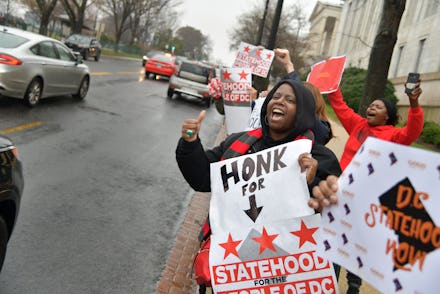D.C. statehood just took a huge leap forward — into a near certain deadlock

An effort to turn the nation's capital of Washington, D.C., into a full-fledged state cleared a major hurdle this week, as the House of Representatives narrowly advanced a bill to establish "The State of Washington, Douglass Commonwealth." The vote for H.R. 51, the Washington, D.C. Admission Act, came down along strict party lines, with 216 Democrats in favor, and 208 Republicans against.
Speaking ahead of Thursday's floor vote, D.C. Del. Eleanor Holmes Norton, the capital city's non-voting delegate to the House, laid out the stakes of admitting D.C. as a state, noting both that the District has a larger population than several existing states, and that it already pays more federal taxes per capita than anywhere else in the nation.
"Congress has a choice," Holmes Norton explained. "It can continue to exclude D.C. residents from the democratic process, forcing them to watch from the sidelines as Congress votes on federal and D.C. laws, and to treat them, in the words of Frederick Douglass, as 'aliens, not citizens, but subjects.' Or it can live up to our nation's founding principles, join the 54% of Americans — and growing — who support D.C. statehood and pass H.R. 51."
But having barely cleared the House, the push to make D.C. a state in its own right is almost certain to stall in the Senate, where Democrats have a one-vote majority over the GOP. That's well below the 60-vote threshold necessary to overcome the virtually guaranteed Republican filibuster to prevent the addition of a new state, and its two new — likely Democratic — senators.
This past summer, then-Senate Majority Leader Mitch McConnell condemned the push for D.C. statehood as "full-bore socialism" and vowed that "none of that stuff is going anywhere."
McConnell had previously refused to even bring the issue of statehood to the Senate floor in 2020, when an earlier iteration of the bill was passed by the House, 232-180. That vote marked the first time D.C. statehood had made it through either chamber of Congress. Now, with a narrow Democratic majority in the upper chamber, however, there remains a chance — however slim — that D.C. statehood could in fact move ahead in the Senate for the first time in history.
But it's not only Republicans who might doom D.C.'s chances in the upper chamber of Congress. With the filibuster threat a de facto dealbreaker for the bill, two Senate Democrats — West Virginia's Joe Manchin and Arizona's Kyrsten Sinema — have steadfastly refused abolish the practice, even if, as Manchin has stated, he's "open" to the possibility of a 51st state.
Meanwhile, with the bill likely — for now at least — to languish in the Senate, D.C.'s roughly three-quarter of a million residents will remain voiceless in Congress, as they have been for more than 200 years.